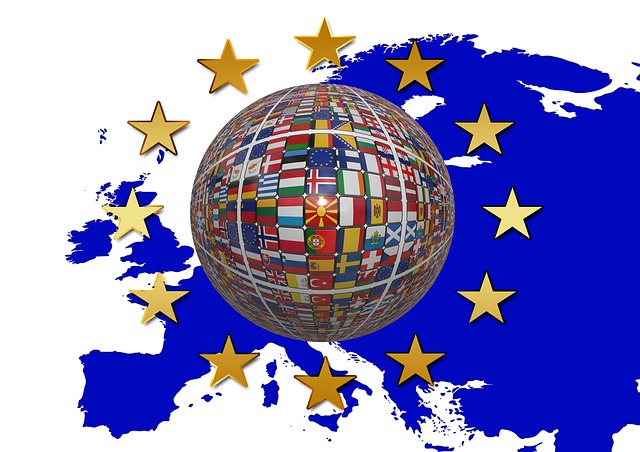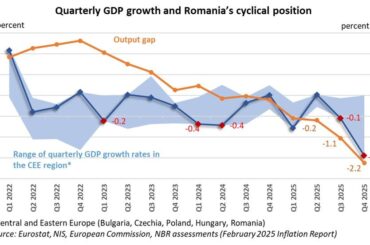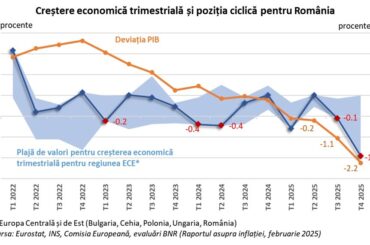All eyes in Europe are riveted on the migrants/refugees’ crisis, which has come as another major shock following the financial crisis and the euroarea troubles of recent years.
The migrants/refugees’ crisis and the euroaria troubles have revealed the fragility of the Union, which, for many, is likely to be a shock in itself. More than worrying is the pretty low response capacity of the Union to such shocks. Can the Union pull itself together, can it reengineer itself? Below is a reading of the Union’s turmoil and avenues for policy action are outlined.
Some premises for analysis
The Union is going through the most critical period in its history; it is facing an existential crisis, as former Council president, Herman van Rompuy, put it. Its roots are economic and financial, linked with a deep euroarea crisis, demographics, over-debt ( debt-overhang) and, frequently, inadequate leadership and governance. “Regaining citizens” (to paraphrase Etienne Davignon insightful observation, that “we have lost the citizens”), hinges on redeeming what the EU means for Europe and on better policies at the national and European levels; it also relies on politicians being more honest and truth telling about problems and challenges.
The European Project needs to be explained better to citizens, in the light of what it has brought about after the end of the second world war and the new challenges facing Europe. This demarche is a must in order to make more clear what this project means for the peace and economic wellbeing of EU member states in a world of tremendous change and facing by huge challenges. But for this demarche to be successful policy-makers in Brussels and national capitals have to tackle the “democratic deficit”. Unless this id done legitimacy of decision-making will be an increasing challenge in the Union; citizens have to sense and see that they have a say in the policy-making process at both the national and the EU/euroarea levels.
When it comes to policies, the Union needs to strike more of a balance between public governance and market forces; the neo-liberal bent of the past decades has to be addressed and redressed, especially during a period of extreme duress for most citizens and rising inequalities.
The Union needs both more responsibility and solidarity. These aims and policy dimensions should be practiced both internally, in the member states, and in the EU, among member states.
There are no quick fixes for dealing with the deep weaknesses of the Union. The “Five Presidents’ Report” opens new vistas and could be seen as quite far-reaching regarding euroarea reform. But this is only a starter and is not devoid of conceptual contradictions. For instance, it alludes to a “fiscal capacity”, but this is envisaged only after structural convergence would have reached a high level in the euroarea; this looks like a catch-22 problem for the governance of the euroarea. Asymmetric shocks is a huge challenge and dealing with it cannot be put off until structural convergence will have taken place. The fracture between North and South in the euroaria may even deepen in an environment of very feeble economic growth and major uncertainties, in spite of ongoing structural reforms (which, by the way, are time consuming).
The euroaria crisis
The fate of the EU depends on the fate of the euroarea. The latter has a poor design and improper policy arrangements, as the “Five Presidents’Report says in a straightforward manner; in addition, it is not an optimal currency area, which has favored a growing cleavage between North and South. The Greek debacle is only the tip of the iceberg. Unless the euroarea reforms its institutional and policy arrangements in a profound way it would be hard to see it survive, which would cripple the EU itself fatally. In spite of a new arrangement last Summer, which has prevented a Grexit (for the time being), the Greek drama continues. This imbroglio will keep pressure on the Union. And without debt relief Greece will continue to sink.
Germany is right to emphasize the need for rules to be observed. But rules need to be embedded in an appropriate institutional and policy setup, which is not the case currently. And policy incrementalism has shown its limits in helping the euroarea reform itself.
The Banking Union is far away from being the exit from overall troubles. Joint institutions and policies that fit a monetary union are badly needed. A “fiscal capacity” is a must in order to deal with asymmetric shocks, and a collective insurance scheme has to complete the Banking Union.
Some member states’ insistence on rules needs to be complemented by fiscal integration and strong policy coordination; the latter asks for joint bodies including a sort of an “executive” and “legislative branch” for the euroarea; these would take the euroarea in the realm of political integration be it a longer term endeavor.
A less fortunate idea would be to change the rules of the game in the eurorea and have countries entering and exiting depending on their economic performance. Such an euroarea would no longer be credible, entailing a lot of uncertainty, and the euro itself would be a crippled currency. A country could/should get into insolvency (as it can happen in the US), but not be forced out of the euroarea; it should be prodded to undertake structural reforms, which may be quite painful, while the joint “fiscal capacity” and other new policy arrangements should mitigate the pains for its citizens.
Policy coordination in the eurorea asks for more symmetrical burden sharing when it comes to adjustment. It does not pay, ultimately, for Germany to run enormous external surpluses, which dampen aggregate demand in the euroarea and makes adjustment harder for deficit member states.
New Member States, which are outside the euroarea and our bound by Treaties to join it, should do it provided, first, they achieve a substantial amount of structural convergence and, second, the euroarea reforms itself decisively.
Economic growth policies
It is hardly realistic to think that European economies could embark on the growth rates of previous decades. Demographic change, an overwhelming debt overhang (on average, about 250% of GDP, both private ad public, in euroarea), the poor functioning of the euroarea, and too little investment handicap, inter alia, Europe. However, there are ways to make economies less fragile and likely to achieve reasonable growth rates, be these rates lower than during the precrisis two decades. There is need to invest more (The Juncker plan is, arguably, insufficient), to improve the quality of public goods (education), to pay more attention to R&D and make the Union more attuned to the digital world, and to defy the current deflationary bias of the euroarea by changing its functioning.
Climate change is also a huge policy issue. And as Pope Francis has made so clear, bold action is needed to forestall human driven disaster, that could bring about the extinction of human race. Pure economic logic is not a help in devising proper policies for coping with climate change. The EU has to embark on close cooperation with the other big players in the global economy in this respect.
Reconsidering the Single Market logic
The Single Market (that regards the EU as a whole) should rely on a revamped conceptual framework –some of it outlined in the Monti Report of 2010. However much we praise and value competition as a driver of entrepreneurship and economic dynamism, there are market failures and power asymmetries in the EU, which need to be seriously addressed. The financial crisis has indicated the flaws of a paradigm that takes for granted that markets always know better, that systemic risks are non-significant, that “light touch regulation” is fine, that business unethical conduct is quite rare.
The Single Market policies should heed the lessons of recent decades, which teach that increasing income inequality, “winners take all” competition, harm economic growth over the longer term (OECD and IMF studies are quite telling in this respect).
If we accept, as a working assumption, that deeper integration is the way forward for the EU in order to cope with current and future challenges, a more balanced policy paradigm is badly needed. To the extent member states are asked to relinquish more of their sovereign prerogatives, what would be lacking in the policy mix at the national level has to be replaced by an enlarged and more diversified tool and policy box at the supranational level; in the euroarea this would take the form, for example, of a “collective unemployment insurance scheme”. This logic could be seen as a “subsidiarity principle in reverse”, and would fit a motion to a more integrated EU.
Unless this is done, fragmentation and “nationalizing” tendencies will gather force, and the Union will be constantly battered by internal shocks and conflicts among member states; muddling through will be the hopeful scenario, and fading away/demise would be the bad outcome.
Business and Ethics
Big Business has to show more convincingly its social responsibility mission, if it actually operates. There has been a rising number of scandals in finance, in other industries, which foment hostility toward business companies and their perceived reckless profit-maximization behaviour (short-termism at the expense of society’s stakeholders’ interests). Tax evasion and avoidance has turned into a big policy issue in the Union and blame has to be assigned to the connivance of not a few member states in this regard. Big business has to change its conduct, be more ethical. Unless this happens, even more radical ideas will encroach on peoples’ minds, which may be inimical, in the end, to checks and balances, to democracy. The latter relies on a strong middle class, on an equitable income distribution and on a sense of trust and fairness among social and political actors. When mistrust and animosities abound, the social fabric is torn apart and democratic politics are impaired. More authoritarianism in public and political life would be on the rise.
The Investment and Trade Pact with the US has to serve society as a whole; citizens have to see benefits of this pact. If it will not happen, more hostility toward business will be invited in the EU.
Politics in the Union
Visionary and effective leadership has become a scarce commodity in the EU. Ever fewer governments are capable of delivering what they pledge during election times. And few politicians have the guts to speak honestly about the new economic and social environment. This enhances mistrust among citizens and poisons the relationships in the EU –which is seen by not a few as the cause of misery. Credible leaders have to underscore the importance of the EU, to moderate people’s expectations about economic growth in the new environment (the “new normal”), combat racism, xenophobia, chauvinism, and foster EU identity and common policies.
Politicians need to pay attention to “fairness” when they formulate public policies; wherever fairness is forgotten the road to social turmoil is nearing rapidly. In addition, it is hard to argue that democracy can be solid when social cohesion is damaged, when people at large feel that they do not benefit on policies bestowed on them, or that costs of adjustment (austerity) are not evenly distributed.
At the same time, however, policies in the EU need to consider that unrestrained globalization and declining competitiveness of not a few member states is a recipe for “inward looking” proclivities of citizens and national governments. Likewise, Europe cannot harbour whoever flees areas of much distress around the world. A wise balance has to be found in this respect between solidarity, humanitarian concerns, and pragmatism, common sense in economic policies. Otherwise we will see failing EU policies repeatedly. The EU needs to have a more clairvoyant international aid and development policy.
The European Parliament has to be more visible in domestic political debates. MEPs do not matter much in domestic politics, which is a nuisance if we think that the fate of the Union hinges on “more Europe”. It may be useful to create joint committees among MEPs and MPs, be they under the guise of task forces, which should create bridges among national and European legislatures. MEPs should attend meetings of national parliaments periodically.
A Council of Wise people should be set up to advise EU institutions on issues of utmost concerns, including the reform of its settings. This group of people should produce its own report on the future of Europe, which should complement the
“Five Presidents’ Report”.
Security policy
Common foreign and security policies have to be strengthened, as it has to happen with energy policy as well. The Union has to develop more consistent, effective policies for tackling conventional and non-conventional threats, including cyberfare and terrorism.
Devising better policies for dealing with the disorder in the Arab world, with the massive flow of migrants/refugees is a must; it should not rely on ad hoc measures only and it should tackle the roots of the problem including blatant mistakes made by western countries in their foreign policies, in the Arab world included. It is true that aging in Europe is a formidable challenge and that immigration can help improve demographic trends at home. But to hail the current massive flow of migrants/refugees as the solution to demographic strain at home is to miss the policy conundrum many governments are facing, which is, not least, related to security concerns. One should not mix up a possible opportunity over the longer term with existing policy trade-offs and enormous security concerns. As Donald Tusk, the president of the European Council has emphasized, the borders of the EU must be protected.
Ps. These thoughts are strictly personal and should not be attributed to the institutions the author is affiliated with.





